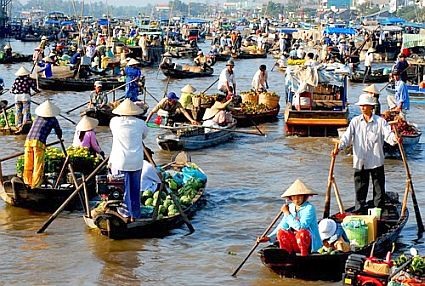 Economy
Economy

Provinces in the Mekong Delta would like to promote tourism as a key sector of their economy but needs more investment in tourism infrastructure, a conference heard on Wednesday in the delta city of in Cần Thơ.
 |
| Provinces in the Mekong Delta and experts told a conference that huge investment in infrastrucutre is needed to foster tourism in the delta. — Photo dulichvn.org.vn |
CẦN THƠ CITY — Provinces in the Mekong Delta would like to promote tourism as a key sector of their economy but needs more investment in tourism infrastructure, a conference heard on Wednesday in the delta city of in Cần Thơ.
Võ Hùng Dũng, director of the Việt Nam Chamber of Commerce and Industry’s Cần Thơ branch, said in his opening speech at the 5th annual Mekong Delta Investment Forum: “The Mekong Delta has huge potential for tourism development, including 40,000sq.km of plains, 500km of coast, the Seven Mountains region, mangrove forests, flood plains and a 200km border with Cambodia.
“However, at present the Mekong Delta has only around 60 three – five star hotels, mainly in Phú Quốc and Cần Thơ, two entertainment complexes Vinpearl Phú Quốc and Nhà Mát in Bạc Liêu province, no upscale or large food courts/entertanment centres/shopping malls to attract tourists. The delta really needs huge investment to boost tourism infrastructure.”
Trương Quang Hoài Nam, vice chairman of the Cần Thơ People’s Committee, said tourism in the delta suffers from a lack of diversity.
“There is not much difference between provinces in the delta.
“If we talk about tourism development in the Mekong Delta, we must talk about waterway tourism. However, waterway tourism has not developed to its potential.”
He pointed out that while the delta does have an airport in Cần Thơ, it is linked only with a handful of destinations like Hà Nội, Đà Nẵng, HCM City, Phú Quốc, and Côn Đảo.
“The delta will develop more if there are air links with more destinations.”
He admitted that there is little by way of amusement for tourists.
“There is no entertainment for visitors at night. We have already asked ourselves many times what we can do at night if we visit the delta. The answer is still ‘nothing’.
“The cuisine around the delta is nearly the same and sports activities on rivers should be considered.”
Phạm Thế Triều, vice chairman of the Mekong Delta Tourism Association, said: “With the current shortage of recreational and lodging facilities, tourism in the delta seems primitive: full of potential and awaiting pioneering investors.”
Trần Bảo Trân, CEO of Sea Media and Asia director of the World Tourism Forum, said: “Undeveloped potential means it is a good opportunity for investors to exploit. We also need to be vigilant about the competition from neibouring countries like Thailand and Myanmar.”
Phan Đình Huê, director of Vietcircle Travel company, said the delta has great potential with its abundant rivers and canals with lovely sceneries, beautiful rural landscapes, nice weather, and great hospitality.
“The delta should focus on cruise tourists: supply is insufficient and tour prices are very high. Retired Japanese are still a promising market which has not been exploited yet.”
Last year the region received 28 million tourists including 2.5 million foreigners, 8.5 million of whom stayed overnight including 900,000 foreign visitors, and earned revenues of VNĐ15 trillion (US$666 million).
Late last year the Government approved a master plan for tourism development in the delta, which is projected to attract 34 million visitors by 2020, including 3.5 million foreigners, earn revenues of VNĐ25 trillion ($1.1 billion).
At the conference, information related to real estate, infrastructure and tourism services was provided to investors. Besides, provinces solicited investments worth VNĐ7.8 trillion ($346 million) in 33 real estate and tourism projects and VNĐ150 trillion ($6.7 billion) in 45 industrial, agricultural, automation, engineering, processing, and logistics projects.
Investors expressed interest in investing in the delta: one each from Dubai and South Korea want to build solar energy plants, a Japanese wants to set up a farm to grow fruits for export and another wants to organise five-star tours to the region.
In the first six months of this year the delta has welcomed 21 million visitors, an increase of 17 per cent from the same period of 2016. — VNS




